|
Oct 26, 1883
|
Born in Aldershot, England to Henry Francis and
Fanny (nee Castle) Kerrison
Henry Stanley Kerrison married Mary Tipler in
Stockport in the 2nd Quarter of 1906
|
|
Mar 1, 1911
|
Embarked the SS Sardinian in London
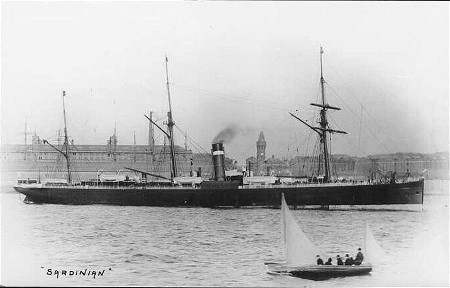
|
|
Mar 17, 1911
|
Disembarked in Saint John, New Brunswick and
proceeded to Kingston, Ontario
|
|
Aug 12, 1911
|
Henry’s wife Mary and son Stanley Jr. embarked
the SS Teutonic in Liverpool
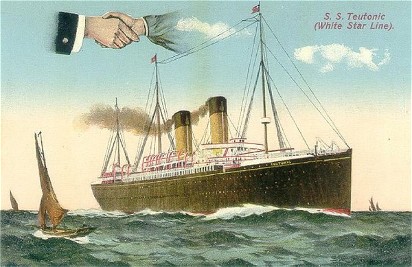
|
|
Aug 20, 1911
|
Disembarked in Quebec City, Quebec and proceeded
to Brockville, Ontario
|
|
Feb 22, 1915
|
Attested into the 21st Battalion in Kingston, Ontario
Ø Number 59544 (temporary number 1247)
Ø Next of kin given as Mrs. Mary Kerrison, wife, 114 Barrack St.,
Kingston, Ontario
Ø Previous occupation given as Chef
Ø No previous military experience given
Ø Religion given as Church of England
Ø Posted to the Depot Company
o Employed as a Cook
The 21st Battalion trained in the Kingston, Ontario
area through the winter of 1914-15.
|
|

|
|
Mar 26, 1915
|
Appointed to the rank of Acting Sergeant while employed as the
Officers Mess Caterer
|
|
May 6, 1915
|
Embarked the RMS Metagama in Montreal, Quebec
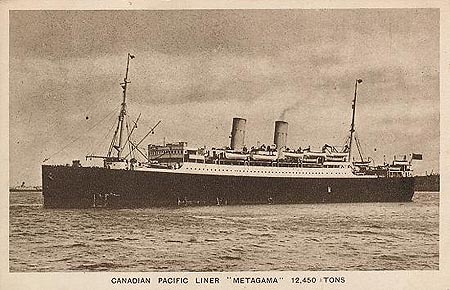
|
|
May 15, 1915
|
Disembarked in Devonport, England and the battalion
proceeded to the West Sandling Camp, near Hythe, Kent to continue training
His wife Mary and son Stanley Jr., followed later
to join him in England
|
|
May 16, 1915
|
Granted working 3rd rate pay as a Cook
while employed in the Officers Mess as a Cook
|
|
Jun 17, 1915
|
Promoted to the rank of provisional Sergeant and
posted to “D” Company and granted working pay as a Cook
|
|
Jul 1, 1915
|
Confirmed in rank of Sergeant
|
|
Sep 14, 1915
|
Embarked the St. Seiriol in Folkestone
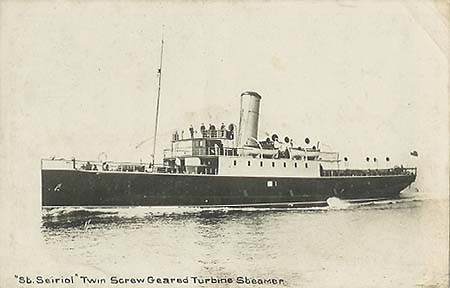
|
|
Sep 15, 1915
|
Disembarked in Boulogne, France and the battalion
proceeded to St. Omer
|
|
Feb 14, 1916
|
Granted 9 days leave
|
|
Feb 23, 1916
|
Rejoined the battalion from leave
|
|
May 5, 1916
|
Admitted to the No. 5 CFA (Canadian Field
Ambulance) with a diagnosis that reads Influenza
|
|
May 9, 1916
|
Transferred to the Division Rest Station
|
|
May 11, 1916
|
Transferred to the NMDRS (North Midland Division
Rest Station) at Mont des Cats, France and the diagnosis was changed to read
Myalgia in the back and legs
|
|
May 18, 1916
|
Discharged to duty from the rest station and
rejoined the battalion
|
|
Jun 9, 1916
|
Admitted to the No. 5 Canadian Field Ambulance
with a diagnosis that reads Inguinal Hernia and transferred the same day to
the No. 4 Canadian Field Ambulance. He
reported that he began feeling pain after lifting a heavy stone
|
|
Jun 11, 1916
|
Discharged to duty from the field ambulance
|
|
Jul 17, 1916
|
Admitted to the No. 2 General Hospital with
double hernia
Invalided to England aboard the Hospital Ship
Marama
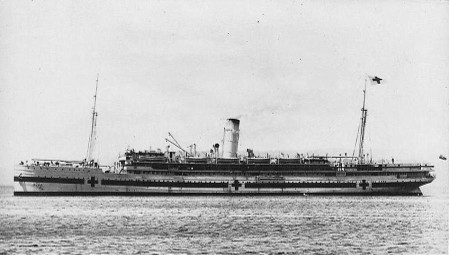
On arrival in England he was admitted to the
Queen Alexandra Military Hospital in Millbank, London
Transferred to the CCAC (Canadian Casualty
Assembly Centre) for pay purposes while in hospital
|
|
Jul 25, 1916
|
Surgery performed to repair his double hernia
|
|
Sep 1, 1916
|
Transferred to the Canadian Convalescent Hospital
in Bromley
|
|
Oct 24, 1916
|
Discharged from hospital
|
|
Oct 30, 1916
|
Attached to the 39th Reserve Battalion
in West Sandling
|
|
Jan 4, 1917
|
Attached to the newly formed 6th
Reserve Battalion in West Sandling.
Shortly after the formation of the battalion, it was moved to Seaford
to train reinforcements for the front
|
|
Jan 27, 1917
|
Henry’s wife Mary and son embarked the SS
Carpathia in London
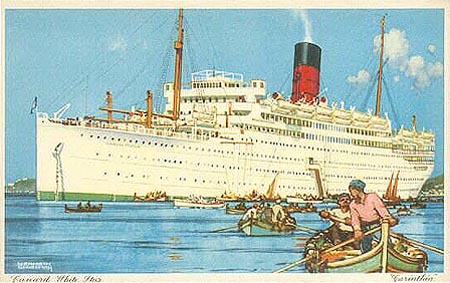
|
|
Feb 9, 1917
|
Mary and Stanley disembarked in Halifax, Nova
Scotia and proceeded home to Kingston, Ontario
|
|
Mar 10, 1917
|
Transferred to the EORD (Eastern Ontario
Regimental Depot) and remained attached to the 6th Reserve
Battalion in Seaford
|
|
Jun 26, 1917
|
Transferred to the 6th Reserve
Battalion permanent staff in Seaford and employed as a Cook
|
|
Feb 19, 1918
|
Transferred to the Eastern Ontario Regimental
Depot and remained attached to the 6th Reserve Battalion
|
|
Feb 23, 1918
|
Ceased to be attached to the 6th
Reserve Battalion and attached to the CDD (Canadian Discharge Depot) in
Buxton pending return to Canada
|
|
Feb 27, 1918
|
Embarked the SS Orpington in Liverpool
|
|
Mar 16, 1918
|
Disembarked in Halifax, Nova Scotia and proceeded
to Kingston, Ontario
|
|
Mar 19, 1918
|
Granted leave until April 1, 1918
|
|
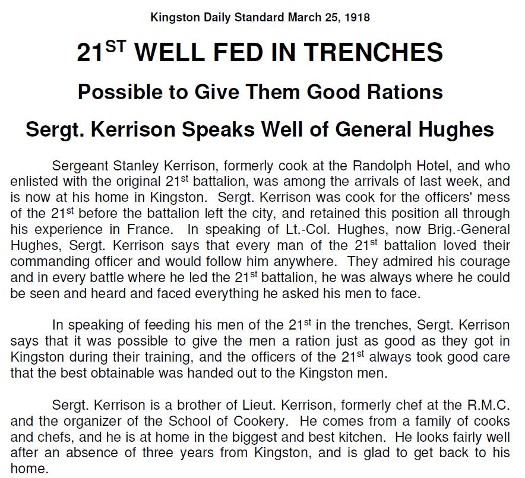
|
|
Apr 18, 1918
|
Taken On Strength Military District No. 3 Casualty
Company in Kingston
|
|
Jun 6, 1919
|
Taken on the establishment of the Discharge
Section “H”
|
|
Aug 13, 1919
|
Transferred to the AMCD (Army Medical Corps
Depot) and posted to the Queen’s Military Hospital in Kingston for duty
|
|
Sep 30, 1919
|
Transferred to the Military District No. 3 Depot
and attached to the RCHA (Royal Canadian Horse Artillery) Depot for duty in
Kingston
|
|
Oct 1, 1919
|
Admitted to the Kingston General Hospital with a
diagnosis that reads External Otitis
|
|
Oct 14, 1919
|
Discharged to duty from hospital
|
|
Dec 24, 1919
|
Medical Board at the Sydenham Military Hospital
in Kingston notes
Ø Man suffers from a medium size
Right Inguinal Hernia
Ø A truss has been recommended
to ease pain
Ø Complains of pain after being
on his feet all day or after lifting objects
Ø Previous surgery to repair
double hernia in 1916 but the right side recurred in 1917
Ø Man is unfit for general
service and board recommends discharge
|
|
Dec 31, 1919
|
Discharged from the CEF in Kingston, Ontario
Ø Rank on discharge Sergeant
Ø War Service Badge Class “A”
issued number 45059
Ø Proposed residence on
discharge 138 Ordnance St., Kingston, Ontario
Following his discharge, the 1914-15 Star,
British War Medal and Victory Medals were sent to him at 138 Ordnance St.,
Kingston, Ontario
|
|
Mar 15, 1940
|
The Canadian Voter list shows Stanley, wife Mary
and son Stanley Jr. living at 2149 Gerrard St. E., Toronto, Ontario
|
|
Apr 9, 1953
|
Henry Stanley Kerrison died of a Heart Attack
while a patient of the Sunnybrook Hospital in Toronto, Ontario and was buried
in the Park Lawn Cemetery in Toronto
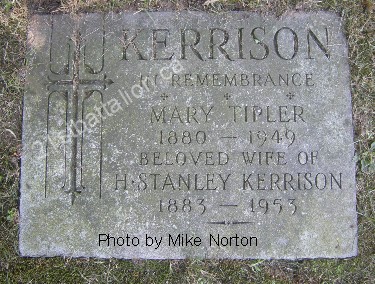
|
|

